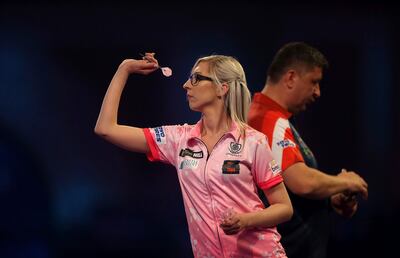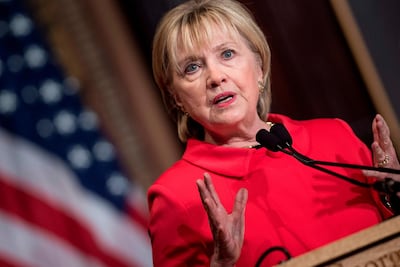Have you heard of Fallon Sherrock? You should have done by now. The 25-year-old British hairdresser is currently on a winning streak in the Professional Darts Corporation world championships, having beaten two of the best players in the world. Last week she made history by becoming the first female player to beat a man; she followed that a few days later by emerging victorious over world number 11 Mensur Soljovic. Tomorrow the slightly built, unassuming mother-of-one will face off, in her trademark flowery pink top, against another star player, Chris Dobey.
Darts, traditionally the domain of dingy pubs and smoky dives, might not be the most salubrious of arenas in which to thrash out a global battle of the sexes; nor is it necessarily the most obvious, as the sport has long had a reputation for being populated with men of a certain age and stature. Indeed, as Sherrock claimed her first victim Ted Evetts, he was heard muttering that he was “on the wrong side of history”.
He was entirely missing the point. It was not that he was competing at the wrong time, but that a long-standing injustice is being rectified. As Sherrock said after her win: “We just do not get the recognition or the opportunity to play against these men so obviously you don’t see it that often. There are more women that can play like me, if not better. We just need more recognition.”
The past decade has been one of peaks and troughs when it comes to defining women's place in the world. The #MeToo movement founded by Tarana Burke in 2006 gathered pace and culminated in an outpouring of allegations citing previously respected doyens of the world of sport, entertainment and politics. It has claimed the scalps of the powerful, the rich and the famous. Movie producer Harvey Weinstein, accused of multiple rapes and sex offences, is unlikely to work again in the film industry. Journalist Shiori Ito, who became the face of Japan's #MeToo movement, won her civil case against her attacker Noriyuki Yamaguchi. Globally, however, the spate of allegations has only resulted in six convictions. It is also disconcerting that victims have had to seek recourse through civil rather than criminal courts, waiving their automatic right to anonymity to name and shame their attackers. That has to change. There has to better protection for those coming forward.
But the fourth wave of feminism, which gained momentum in 2013 and is shaped by technology and online activism, has handed loudspeakers to such voices. The first wave of feminism was fought by suffragettes a century ago to win the vote; the second was driven by the women’s liberation movement of the 1960s and 1970s; the third wave in the 1990s had a greater focus on intersectionality as women of different races and backgrounds called for greater representation. Social media has given a fresh outlet for the current wave. Laura Bates’s Everyday Sexism Project, for example, started in 2012, gave an opportunity for women to catalogue every nuance, every inappropriate comment or gesture that made them feel maligned, sexualised or misinterpreted; it also told them what they were hearing and seeing wasn’t simply their imagination, or a misunderstanding, but illustrated the many subtle ways in which women are undermined on a daily basis.
Yet gender-based violence continues to rise – in India, South Africa and Tanzania, among others. According to figures from the European Institute for Gender Equality, one in three women has experienced physical or sexual violence, half of all women have been sexually harassed, one in five women has been stalked and one in 20 raped. Globally, the World Health Organisation tells a similar story. There isn't a woman of my acquaintance who doesn't have a story about being made to feel uncomfortable, being hounded – or worse – by someone they knew. I know I have. It might not always culminate in an attack but it is deeply distressing and affects how we live, how we conduct ourselves and the freedoms we take for granted, until we are painfully reminded of our own vulnerability.
Time and again, in reports from the likes of UN Women and the World Health Organisation, we are reminded that gender inequality is an underlying cause of violence against women. Twenty-six years ago, in its Declaration on the Elimination of Violence Against Women, the United Nations General Assembly acknowledged that this violence is a manifestation of historically imbalanced power between men and women, yet the link is rarely made by those tackling the scourge of crimes against women. Deal with the root cause, tackle perceptions of women and their rights in society and you will see, alongside greater respect for both genders, a flourishing society in which both men and women contribute and prosper. As a paper released by the Australian Institute of Family Studies in 2014 stated: “Without an existing model of gender equality to demonstrate the end product…it is difficult to pin down the impact that gender inequality actually has as a determinant of violence against women, despite the obvious logic in the connection.”
If there is one woman whose experience encapsulates the progress and setbacks of the past 10 years, it is Hillary Clinton. The turn of the decade was marked by a talk at TedWomen by Ms Clinton, then secretary of state, when she made a surprise appearance on stage in December 2010 in Washington DC and spoke inspiringly of "women as agents of change". But if this has been the decade that shaped what became known as the Hillary Doctrine, it is also the decade that marked the rise and fall of its most vocal proponent. Ms Clinton saw her dreams of becoming America's first female president come crashing down in 2016's shock US election. One could argue – as many have – that this was a sign America was "not ready" for a female head of state. Certainly, the United States of today feels worlds away from the one outlined in the Hillary Doctrine, a term coined by Newsweek in 2011 to refer to her call for women to have a seat at the table on every issue that matters. Remember, too, this is the decade in which a Sheryl Sandberg who in 2013 encouraged us to "lean in" is now being reviled as one of the manipulators-in-chief of the data privacy scandal in big tech firms – so much so that CNBC last week saw fit to opine: "As the 2010s close, Ms Sandberg is one of the faces of the company that for many has come to represent the exploitation of people's privacy and the hubris of the technology industry".
Yet therein lies part of the problem: roles at the top are still so few and far between for women that when they stumble – and make no mistake, Ms Clinton and Facebook’s chief operating officer Ms Sandberg have faltered and taken missteps on many occasions – a glaring spotlight is focused on them as they are seen as failing the entire female species. No one is talking about how Facebook co-founder Mark Zuckerberg – who is surely ultimately responsible for his company’s flaws – has failed all men by duping his website’s users. There is no suggestion that his reputation as a “global icon”, as CNBC referred to Ms Sandberg, is now in tatters. How we talk about women is critical to ensuring they are not deterred from taking a seat at the table, and that their failures are not do-or-die moments that should be taken as measures of the success of 50 per cent of the population, or deterrents to them putting their hands up to participate. It’s an insidious means of subjugation and manipulates an existing tendency to self-doubt, so that fewer women are inclined to throw their hat into the ring to compete.
And yet, if there is one region where women have been front and centre in having their voices heard, it is the Middle East. Hundreds of women joined protests in the streets of Egypt in 2011 to clamour for the fall of then president Hosni Mubarak, and again in 2013 to rally against his replacement Mohamed Morsi, at great personal cost. Many endured appalling physical and sexual violence meted out by mobs and security forces. Egypt is still wrestling with how it deals justly with #MeToo complainants but the past year of upheaval has galvanised women’s movements across the world. From Iraq to Lebanon and from Mexico to Chile, women have been at the forefront of calls for social and political change, using innovative means to protest against inequality, from graffiti and music to flash mobs and marches.
Gender equality is still a long way away. While there are currently 29 female heads of state worldwide, that amounts to just 15 per cent of leaders in 193 countries. The World Economic Forum’s global gender gap report 2020, published this month, said it would take another 99.5 years to achieve gender equality worldwide, meaning most of us will not see real equality in our lifetime. Nations like Ethiopia, where half the cabinet is female, and the UAE, which has instigated the same quotas in the make-up of its Federal National Council, are taking steps to buck that trend. They give us reason to hope that one day, it will not even be worthy of comment when there is gender parity in the workplace, in government and across different fields of achievement. It will simply be the norm.
And there is further cause for hope from a generation of young women and girls, who are going to shape the way we think about the world. They are already doing so – people like Malala Yousafzai, who began the decade recovering from a head injury after being shot by the Taliban in Pakistan and harbours ambitions of one day leading her country; people like Greta Thunberg, whose impassioned pleas to protect our planet have inspired a global movement; and people like Janna Jihad and Ahed Tamimi, whose bravery in standing up to their oppressors has raised the profile of the plight of Palestinians. These are the women we will be hearing about in the next decade; the ones who will set the tone for conversations we all need to be a part of. They, and others like them, might not always hit the bullseye. But like Sherrock, they need the opportunity to step up to the throw line. As any darts player will tell you, having the right skill, proper aim and a good stance makes all the difference in hitting your target.
Tahira Yaqoob is the comment editor of The National




